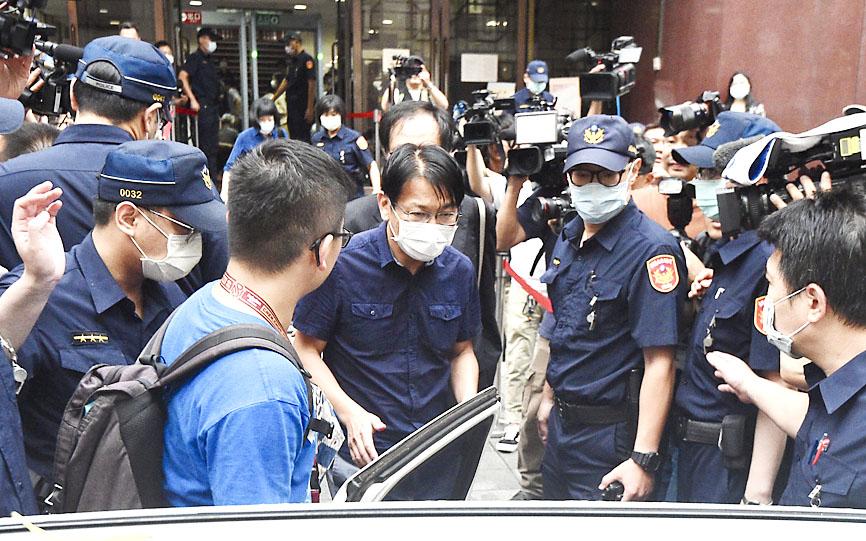The Taipei District Court yesterday ordered that three lawmakers be held incommunicado amid a probe into allegedly bribery relating to an ownership dispute over Pacific Sogo Department Store (太平洋崇光百貨).
The three are Su Chen-ching (蘇震清) of the Democratic Progressive Party, and Chen Chao-ming (陳超明) and Sufin Siluko (廖國棟) of the Chinese Nationalist Party (KMT).
Also held incommunicado were Su’s office director Yu Hsueh-yang (余學洋) and Sufin’s office director Ting Fu-hua (丁復華), as well as Kuo Ke-ming (郭克銘), a political lobbyist and general manager of Knowledge International Consultancy (是知管理顧問公司).

Photo: Peter Lo, Taipei Times
The Taipei District Prosecutors’ Office on Friday raided the offices of six incumbent and former lawmakers for allegedly taking bribes ranging from several hundreds of thousands of New Taiwan dollars to NT$20 million (US$677,071) from Lee Heng-lung (李恆隆), the former chairman of Pacific Distribution Investment Co (太平洋流通), who was also detained yesterday.
The case involves the largest number of lawmakers simultaneously detained since the nation was democratized in 1992.
Su Chen-ching’s uncle, Su Jia-chyuan (蘇嘉全), on Sunday resigned as Presidential Office secretary-general, saying he wanted to avoid affecting the presidency.
Former New Power Party (NPP) chairman and legislator Hsu Yung-ming (徐永明) was yesterday released on bail of NT$800,000, following the release on NT$500,000 bail of former DPP legislator and former minister of foreign affairs Mark Chen (陳唐山). The NPP on Sunday suspended Hsu’s membership.
Hsu’s implication in the scandal has shocked many among the so-called “2014 Sunflower movement generation,” as the NPP was founded by building on the movement’s momentum.
Evidence appears to show that Hsu had made a commitment to the bribers, but whether he accepted the bribe is unclear, the court said, adding that Hsu is forbidden to contact related witnesses.
“I cannot disclose details about the case, but I am absolutely innocent,” Hsu told reporters after his release.
Taipei prosecutors said that the lawmakers are suspected of taking bribes from Lee in 2018 to lobby the Ministry of Economic Affairs to amend Article 9 of the Company Act (公司法) relating to capital increases and to make them retroactive.
The proposed retroactive clause, which might have allowed Lee to take back ownership of the department store chain from Far Eastern Group (遠東集團) chairman Douglas Hsu (徐旭東), did not pass.
Independent Legislator Chao Cheng-yu (趙正宇) was accused of taking bribes from funeral services proprietors Chen Ming-han (陳明瀚) and Chung Ke-hsin (鍾克信) through Kuo. Chao allegedly pressured the Construction and Planning Agency to alter the classification of a plot of land in Taipei’s Yangmingshan National Park (陽明山國家公園), so the proprietors could build a cemetery.
Chao was released on NT$1 million bail on Sunday, while his former aide Lin Chia-chi (林家騏) was detained incommunicado.
The prosecutors’ office on Monday said that Chao should be detained, and has appealed the court’s decision.

ACTION PLAN: Taiwan would expand procurement from the US and encourage more companies to invest in the US to deepen bilateral cooperation, Lai said The government would not impose reciprocal tariffs in retaliation against US levies, President William Lai (賴清德) said yesterday, as he announced five strategies to address the issue, including pledging to increase Taiwanese companies’ investments in the US. Lai has in the past few days met with administrative and national security officials, as well as representatives from various industries, to explore countermeasures after US President Donald Trump on Wednesday last week announced a 32 percent duty on Taiwanese imports. In a video released yesterday evening, Lai said that Taiwan would not retaliate against the US with higher tariffs and Taiwanese companies’ commitments to

Intelligence agents have recorded 510,000 instances of “controversial information” being spread online by the Chinese Communist Party (CCP) so far this year, the National Security Bureau (NSB) said in a report yesterday, as it warned of artificial intelligence (AI) being employed to generate destabilizing misinformation. The bureau submitted a written report to the Legislative Yuan in preparation for National Security Bureau Director-General Tsai Ming-yen’s (蔡明彥) appearance before the Foreign Affairs and National Defense Committee today. The CCP has been using cognitive warfare to divide Taiwanese society by commenting on controversial issues such as Taiwan Semiconductor Manufacturing Co’s (TSMC, 台積電) investments in the

HELPING HAND: The steering committee of the National Stabilization Fund is expected to hold a meeting to discuss how and when to utilize the fund to help buffer the sell-off The TAIEX plunged 2,065.87 points, or 9.7 percent, to close at 19,232.35 yesterday, the highest single-day percentage loss on record, as investors braced for US President Donald Trump’s tariffs after an extended holiday weekend. Amid the pessimistic atmosphere, 945 listed companies led by large-cap stocks — including Taiwan Semiconductor Manufacturing Co (TSMC, 台積電), Hon Hai Precision Industry Co (鴻海精密) and Largan Precision Co (大立光) — fell by the daily maximum of 10 percent at the close, Taiwan Stock Exchange data showed. The number of listed companies ending limit-down set a new record, the exchange said. The TAIEX plunged by daily maxiumu in just

‘COMPREHENSIVE PLAN’: Lin Chia-lung said that the government was ready to talk about a variety of issues, including investment in and purchases from the US The National Stabilization Fund (NSF) yesterday announced that it would step in to staunch stock market losses for the ninth time in the nation’s history. An NSF board meeting, originally scheduled for Monday next week, was moved to yesterday after stocks plummeted in the wake of US President Donald Trump’s announcement of 32 percent tariffs on Taiwan on Wednesday last week. Board members voted to support the stock market with the NT$500 billion (US$15.15 billion) fund, with injections of funds to begin as soon as today. The NSF in 2000 injected NT$120 billion to stabilize stocks, the most ever. The lowest amount it